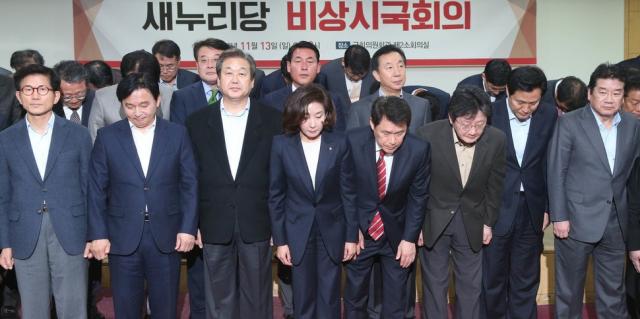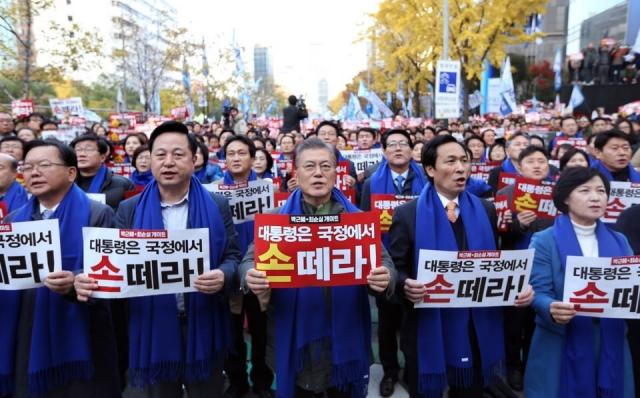Politicians from across the aisle clamoring for Pres. Park’s resignation
Posted on : Nov.14,2016 16:51 KST Modified on : Nov.14,2016 16:51 KST
Park seems unlikely to resign, despite public consensus, as politicians explore options for impeachment or resignation
South Korea’s politicians are quaking after the public sentiment that was expressed in the “million candle protest.” Now that it is clear what the public desires, politicians from both sides of the aisle have set aside the various solutions they had been toying with and have resumed their discussions in earnest. Instead of ambiguous calls for President Park Geun-hye to play a secondary role in the government without specifying which powers she should relinquish, the pendulum is rapidly swinging toward Park stepping down or being impeached, reflecting the demands made by the protesters.
|
|
|
After an emergency meeting of non-mainstream members of the Saenuri Party that was held at the National Assembly on Nov. 13, members bow in apology to the public. From left to right, former Gyeonggi Province governor Kim Moon-soo, Jeju Governor Won Hee-ryong, former Saenuri Party leader Kim Moo-sung, lawmakers Na Kyung-won, Lee Kun-hyun and Yoo Seong-min, former Seoul Mayor Oh Se-hoon and lawmaker Kang Seok-ho. (by Lee Jeong-woo, staff photographer) |
Even members of the Saenuri Party are clamoring for Park’s impeachment or resignation
Politicians who had been dragging their feet were shaken up by the “one million candle” protest in Seoul on Nov. 12, though this effect is more evident in the ruling Saenuri Party than in the opposition parties. During an emergency meeting of non-mainstream members of the Saenuri Party that was held at the National Assembly on Nov. 13, there was open discussion of Park’s impeachment or resignation (topics that key members of the party had banned), and a proposal was made to consider an “orderly disintegration” of the party. Participants in the meeting shared the sense that they ought to recognize that Park and the Saenuri Party had already been condemned in the court of public opinion.
Leading presidential candidates were the first to speak up. Former Saenuri Party leader Kim Moo-sung bluntly proposed “moving down the road toward impeachment in the name of the public,” while Jeju Governor Won Hee-ryong said, “This problem has to do with Park herself, and she is at the heart of it. Park needs to make a decision about her course of action.”
The remarks by presidential contenders in the party varied in their intensity, but all of them put pressure on Park to make a tough call. “It’s time for both the president and the party to just let go and give it all up,” said Rep. Yoo Seong-min. “This is the time for both the party and the president to make an important decision,” said former Seoul mayor Oh Se-hoon. “The people have wiped the president from their hearts,” said Gyeonggi Province governor Nam Kyung-pil.
“The Saenuri Party’s final role now is to help President Park make an orderly departure from office,” declared Jung Byeong-guk, a fifth-term lawmaker, during the meeting on Nov. 13. Rep. Ha Tae-gyeong also voiced his opinion during the meeting: “There are two options: either President Park can take the initiative, or the Saenuri Party can. President Park has been given her final chance to resign [on her own initiative]. If she refuses to do so, the Saenuri Party will have no choice but to initiate impeachment proceedings,” Ha said.
“Since we have to work within the constitutional framework, it would be better to agree about moving forward with impeachment proceedings when the conditions are right,” said Rep. Na Kyung-won, a veteran member of the Saenuri Party who is not aligned with Park.
There is a gradually growing sense even within the Saenuri Party that moving forward with impeachment is the way to minimize confusion under the current constitutional system, since there is little chance of Park stepping down on her own accord. Before the emergency meeting on Nov. 13, Saenuri Party floor leader Chung Jin-suk added a post to his Facebook page that hinted at the possibility of deliberating about Park’s resignation or impeachment: “We will be discussing whether the ruling and opposition parties will jointly manage the period of the transfer of power or whether we will risk a suspension and breakdown of constitutional government.”
|
|
|
From right to left, Minjoo Party Leader Choo Mi-ae, floor leader Woo Sang-ho, former leader Moon Jae-in, lawmakers Kim Doo-gwan and Kim Boo-gyum chant slogans condemning President Park Geun-hye and the Choi Sun-sil scandal, at Cheonggye Plaza in central Seoul, Nov. 12. The placards read, “President Park - hands off national affairs!” (provided by the office of Moon Jae-in) |
Opposition game plan for a Presidential resignation
After the candlelight rallies of Nov. 12, calls for an all-out fight to pressure Park into resigning began spreading even within the opposition Minjoo Party, which had previously adopted an official platform of demanding a “conditional resignation” in which it would launch such a fight if Park refused to retreat to a secondary role. The opposition People’s Party and Justice Party, which have both already adopted the fight as their platform, are now coming out with concrete game plans to force a resignation.
Min Byung-doo, a third-term Minjoo Party lawmaker and strategy expert who previously proposed a “fix” in which Park would take on a secondary role, a transitional Cabinet would be formed, and a presidential election would be held ahead of schedule, wrote on his Facebook page on Nov. 13 that “we should not hesitate to go to the next stage now that it has been confirmed that the Blue House is ignoring [ideas for a resolution].”
“We need to begin taking action toward a resignation,” he asserted.
Min also said Park was “politically illiterate if she did not sense that the public’s rage and sense of betrayal are tens to hundreds of times more than politicians had thought in Yeouido [the Seoul neighborhood where the National Assembly is located].”
Road maps for a resignation have also been suggested. Former People’s Party leader Ahn Cheol-soo proposed a three-stage solution on Nov. 13 that would involve Park declaring her intent to resign and a Prime Minister being nominated and appointed by consensus between the ruling parties, after which he or she would take the lead in establishing a political schedule that would include the President’s resignation date.
“First of all, President Park Geun-hye needs to declare her political resignation, accepting the public’s feelings and assuming responsibility by stepping down. The ruling and opposition parties need to select a Prime Minister, and that bipartisan consensus Prime Minister needs to come out with a future political timetable that specifies the date of the President’s legal resignation,” Ahn said.
Justice Party leader Sim Sang-jeung held an emergency press conference at the National Assembly the same day to present “four tasks for practice,” including development of a unified opposition plan for Park’s resignation and a transitional Cabinet and swift passage of legislation for a special prosecutor to investigate the Park/Choi scandal.
“We need to avoid feeding controversy with fuzzy talk about a Cabinet ‘cohabited’ by Park Geun-hye, as with a secondary role scenario or national Cabinet, or confusing the people’s judgment with demands that get away from the substance, such as the calls for the President to leave the [Saenuri] party,” Sim said.
“The three opposition parties need to form an emergency joint council for an orderly resignation, which would encompass themselves along with civil society and the religious community,” she suggested.
Previously quiet calls for Park’s impeachment have also begun sounding loud and clear from the opposition. If Park does continue holding out as she has done so far without accepting the demands in the streets for her resignation, the opposition has no option but to begin legal procedures toward impeaching her.
In a Facebook post on Nov. 13, People‘s Party lawmaker Park Jie-won urged the Blue House to adopt a plan in which Park would leave the Saenuri Party and a consensus Prime Minister would be chosen through a meeting of party leaders, followed by a parliamentary audit, agreement to a special prosecutor, and an “orderly resignation.”
“Stepping down means resignation and impeachment,” Park said in his ultimatum.
Indeed, while most opposition party insiders had predicted impeachment to be unrealistic while the combined ranks of the three opposition parties and independents remain 29 seats short of the number needed to approve it, signs of intensifying discord in the Saenuri Party over the President’s fate and the plans for addressing the situation have resulted in impeachment emerging as a strong alternative for relieving the political stalemate.
“There’s no reason to hesitate any longer when the non-Park wing in the Saenuri Party is taking the lead in bringing up impeachment,” said a Minjoo Party source.
“The impeachment card could actually feed into the Saenuri Party’s internal strife and lead to splintering,” the source predicted.
Sim Sang-jeung has also suggested that the National Assembly begin impeachment procedures immediately, and that a President impeachment review committee should be set up at the same time under the National Assembly speaker to prepare for and review the legal and political issues prior to the impeachment motion being presented.
By Lee Se-young and Lee Kyung-mi, staff reporters
Please direct questions or comments to [english@hani.co.kr]





